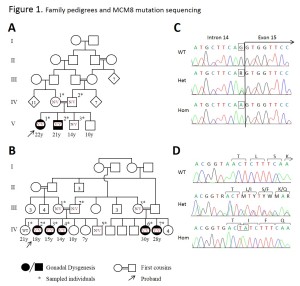Primary gonadal failure is characterized by a lack of spontaneous pubertal development, primary amenorrhea or early menopause in females, and underdeveloped testis and azoospermia in males. Its genetic causes remain mostly unknown.
Variants of the minichromosome maintenance complex component 8 gene (MCM8) are significantly associated with early menopause. Mice lacking MCM8 are sterile. We sought to elucidate the genetic etiology of gonadal failure in two consanguineous families: family 1’s index case presented with primary amenorrhea and her brother had azoospermia; family 2’s five affected females had primary amenorrhea.
Using whole-exome sequencing, we identified two novel homozygous mutations in MCM8—splice (c.1954-1G>A) and frameshift (c.1469-1470insTA)—that segregated with the disease and were absent in 100 ethnically matched controls. The splice mutation (family 1) led to three different aberrant transcripts and a significant decrease in total MCM8 message. The frameshift mutation (family 2) predicted a premature stop codon. DNA-repair capabilities showed significantly increased chromosomal breakage.
Our findings indicate that MCM8 is crucial for gonadal development and maintenance and suggest its relevance in the larger context of reproductive lifespan in humans. (http://jmg.bmj.com/content/52/6/391 )
